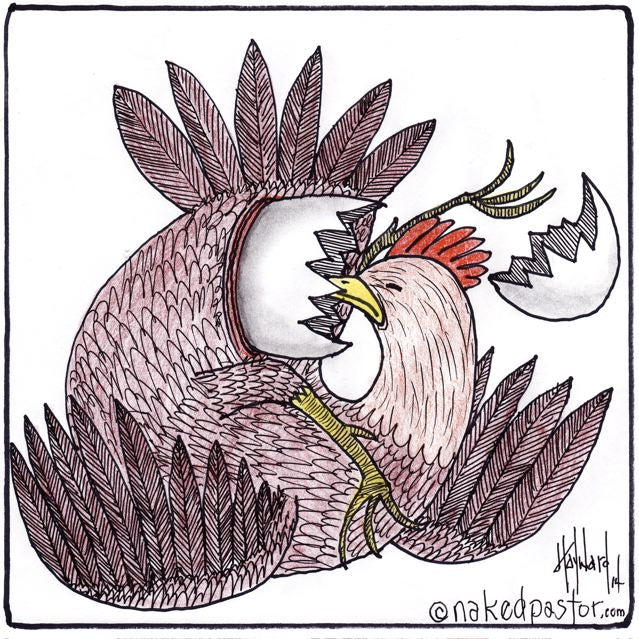Join our Newsletter
If you like The NakedJournal, you'll enjoy my weekly newsletter about deconstruction, freedom, and life in general.

This drawing is inspired by the Ouroboros Snake... of the snake eating its own tail.
What came first? The chicken or the egg? What came first? The thug or the theology? I read Tony Jones' thoughts on Mark Driscoll.
Jones has always admired Driscoll, maybe envies him a little, wants the best for him, believes he can be redeemed, and suggests that things can be restored.
What I found most interesting though is that Jones believes the problem with Driscoll is theological.
That is, did Driscoll become the focus of concern because of his theology? Or was it because of his behavior?
I'm concerned that Jones' post reflects the refusal of the church to understand spiritual abuse. It neglects the pathology of its abusive leaders. I don't think this is being fair to the victims or the perpetrators of spiritual abuse. People are victims of not just a bad theology, but a pathological cruelty.
I don't think Driscoll's theology made this happen. Driscoll "embraced" his toxic version of theology because it aligned with his moral compass. It fit his personality. It worked for him to achieve his goals. Then it manifested the worst in him. Then he continued to develop his toxic theology in order to make more room for his pathological behavior. Mars Hill Church too.
Jones' sentence, "It could have happened to any of us." is true, because I believe we all participate in this dynamic. Theology is our creation. It is a reflection of our drives and desires.
Then, not satisfied to only be the product of our drives and desires, it also becomes the producer of them. Theology is a vicious cycle of our desperate need to understand and control our universe.
Step into this cycle at any point and you can see that we are both the root and fruit of our theology and pathology.
And yes, it spins out of control by manifesting itself in toxic, controlling, and abusive behavior. Nothing can be done about bad theology because of free thought and speech.
But we can do something when this manifests itself in bad behavior. Cruel theology is a nuisance. Cruel behavior is unacceptable.
When Driscoll thinks bully to his people, we can say please stop. But when he actually bullies people, we can step in and say you will stop now!
I don't think this is a theological issue. I think it is a pathological one. Not just for Driscoll and Jones, but for the entire church.
If we would be healed, our theology would take care of itself.
1080 comments
That’s a fair question Bill. To be honest, I’m not really sure why I want to know more. Probably just a personality quirk – when I get interested in a topic I can get a little obsessive about pursuing it, want to know everything I can about it. Comes in handy for my work but obviously can be quite annoying in other settings. Sorry about that. Don’t mind me. I was honestly just curious. I’ll do my best to let it go now.
Thanks for the advice Tim. And no “impartial” was not meant to be ironic. It was just a reference to the fact that since I have no direct connections to any of these people, I really have no skin in the game – no side to take. I am a journalist by trade (though NOT doing a story on this… please don’t assume that!), so I was just doing what I do in hopes of piecing together a more coherent story. Even after 600+ comments I still don’t feel like I have a clear picture of what exactly happened. But I suppose I’ll just have to wait for Julie’s e-book. I look forward to buying/reading it!
“Alex”,
(Quotes as I doubt it’s your real name), why do you personally have a need to “get some answers”?
This is not about you… unless, of course, it is.
Accept whatever narrative you want. No one is asking you to choose a narrative. There has been a narrative proliferated by the ones with the microphone and the audiences and now Donna, Julie, LostVoice, Chuck, Andrew, Mike, Nate, Darren, Pat, Jenell and many others are sharing in this safe space their stories if what they experienced and heard and witnessed. You are doing a really lousy job at being an impartial observer FYI. Ask my son about the night dad threw mom across the room. Ask my daughter how she ran and hid under her bed and for months when I could not find her she was in her room under her bed. Ask my youngest about thinking his dad was dead because he went MIA for months in Texas without a word or penny for his family he abandoned. “Mom, did Daddy die?” Kinda done with you Shelley Pagitt or whomever you really are. Do you live in Minneapolis? Come over and I’ll give you 10 minutes to look at my corroborating evidence. But there is no evidence for the deep emotional scars my children bare.
P.S. You have come across to me as being quite demanding. I have no desire to make someone adopt a particular tone before I’ll listen to them. But please consider whether your expectations are realistic, particularly given that Julie has been more than forthcoming, with a multitude of details, especially for a public forum.